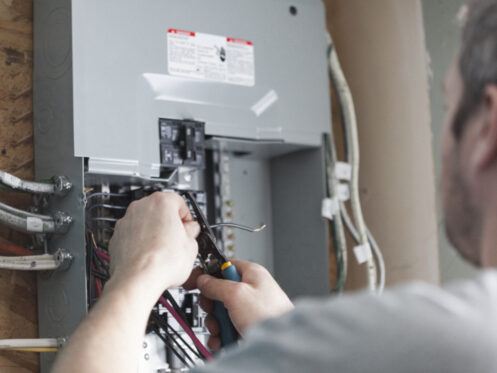Imagine relaxing in your house one night in a snowstorm when the power suddenly goes out. With no backup, your heating systems go down, and you are left in the cold.
The weather in Texas is dynamic due to the state’s large size. Different areas are exposed to varying weather conditions, including rain, wind, wildfires, flooding, the extreme heat of scorching summers, and the bitter cold of freezing winters.
Even though air conditioners are designed to help, these extreme temperatures can strain your system and lead to disruptions and failures.
Impact of Texas Weather on Electrical Systems
Texas is the only state to have its own energy grid; it covers 213 out of the 254 counties. The forecast of extreme weather in Texas can increase energy rates. On a normal day, Texans use about 20% of the electricity in the grid, but on extreme weather days, they use up to 50% of the load.
This causes electricity bills to soar abruptly, which can put a strain on homeowners’ budgets. The weather can also significantly impact the performance and safety of your electrical infrastructure. Understanding these effects is essential for having a safe and reliable electrical system in your home.
Hot Weather
Extremely hot weather can be brutal, especially if your cooling system starts malfunctioning. Exposure to direct, intense sunlight negatively affects the electrical wiring outside your home, which will struggle to distribute power.
Upon expanding from the heat, the line will sag too much, which will result in a short circuit and the line’s inability to carry power. Other lines have to pick up the extra load of the fallen line, but they, too, become overloaded and promptly follow suit due to the increase in the voltage carried.
You may notice bulbs dimming or appliances turning on and off during a heat wave. During such an event, it is important to switch off appliances that are not in use. You also need to remove appliances that are exposed to direct sunlight because electronics are sensitive to heat. This brings problems with connections and insulation to your electric equipment, exposing you to danger.
During a heat wave, your air conditioner works continuously to combat the rising heat, which can overload the circuits. This causes overheating that could not only damage your appliances but also increase the risk of electrical fires due to circuits and wires melting.
Insufficient airflow to electrical panels or other equipment causes overheating when the heat accumulates. Inadequate insulation can also be a factor because it lets too much heat into your house.
Cold Weather
A deep freeze that occurred in Texas in 2021 brought subzero temperatures across most of the state. When enduring such conditions, you rely heavily on heating systems to keep your indoor spaces warm and comfortable. If sleet or snow falls relentlessly, the buildup of ice can become too heavy for most power lines and cause them to snap.
Additionally, the ice can seep into your home and cause severe damage to your electrical systems when it melts. This can lead to power outages as well as electrical fires when the melted water comes into contact with naked wires.
Electrical materials experience an increase in resistance when temperatures plummet. This resistance can affect the flow of electricity, leading to voltage fluctuations.
Winter storms can force power lines on the grid to sway back and forth or snap. Given the combination of ice and wiring, fallen grid lines can cause sparks or electrocution. Consequently, strong winds can force grid lines to touch and disrupt the distribution of electrical current.
A tripping mechanism is a safety measure that helps prevent overheating or electrical fire. Sudden power surges due to the spiked demand caused by the cold weather can cause the breaker box to trip.
As temperatures plunge, the plastic and rubber insulation encasing wires contracts and shrinks. This puts stress on connections where wires join boxes, outlets, and other equipment. Using space heaters, electric blankets, and other heating appliances can lead to overloaded circuits.
Thunderstorms and Lightning
Besides winter, rainy days are usually accompanied by thunderstorms and lightning, which can cause sudden voltage spikes that travel through electrical wiring. This damages sensitive electronics, appliances, and even the electrical system of your home, which is not immune to the effects of cold and moisture.
When moisture from the rain leaks into unprotected areas of your house, it leads to corrosion, deteriorating insulation, and damage to wiring and electrical components.
During heavy rains, power line poles are prone to breaking and falling due to the accompanying strong winds or branches and trees falling onto them. This disrupts the transmission of power and leaves you vulnerable.
Tornadoes
Texas, particularly the Dallas-Fort Worth area, is part of the “Tornado Alley” of the Great Plains, which is especially prone to the destructive nature of these violent whirlwinds. They create vast amounts of electrical energy in the area they hit due to the intense ion flow inside the vortex. This energy brings about an electromagnetic field that disrupts the electrical systems of houses.
Protecting Your Electrical Systems From the Weather
Now that you are aware of how the weather impacts your electrical system, it is important to understand the steps you can take to mitigate the negative effects.
Seal Leaks
It is important to seal gaps and cracks that accumulate over time around doors, windows, or vents. This will prevent cold or warm air from entering or escaping, improving the efficiency of your electrical system.
Install Proper Insulation
Insulation keeps your home warm and comfortable. Installing the proper insulation reduces the amount of energy needed to maintain a comfortable temperature.
Avoid Overloads
It is easy to overload your electrical system during extreme weather. You can mitigate this by making sure to switch off unneeded appliances and only use ones that you absolutely have to. Use surge protectors for sensitive appliances.
Schedule Proper Maintenance
Regular checkups and maintenance of your existing electrical system can go a long way to ensure its longevity and efficiency. Electrical equipment needs timely cleaning and prompt repairs to any damaged part.
Have Backup
Always be ready for extreme weather. Investing in a good generator and keeping it appropriately maintained can ease the burden on your electrical system. Solar generators can be particularly helpful during hot weather.
After the summer drought of 2022, Texans were asked to take energy-reducing steps like minimizing their use of electricity at certain times of day.
At HR Phoenix, we understand that electricians have a crucial role to play in ensuring your electrical system can withstand extreme weather. We deliver residential and commercial services throughout the Dallas-Fort Worth area to provide our customers with peace of mind during the sweltering summer and freezing winter days. Our services include installing generators, electrical panels, whole-home surge protection, EV charging stations, ceiling fans, recessed lighting, and more. We also do electrical repairs, rewiring, and plumbing.
Contact us at HR Phoenix today to schedule an appointment or get more information.


